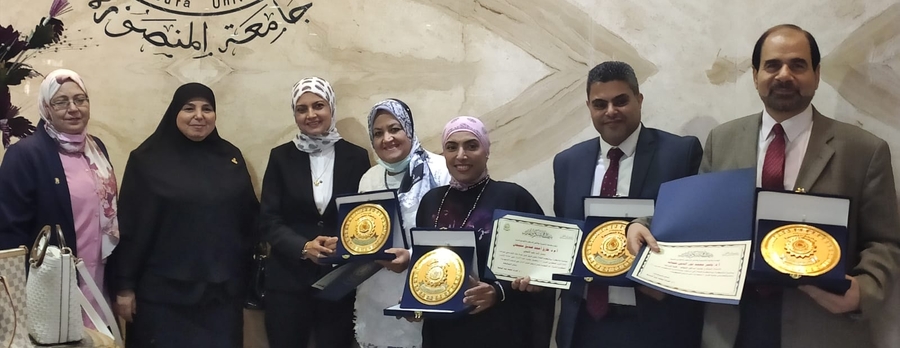Mansoura University honors Egypt Award for Gov't Excellence‘s team

05 December 2021
Mansoura University, headed by Prof. Dr. Ashraf Abdel Basset, President of the University, honored; the work team of the Egypt Award for Gov't Excellence for the effort and close cooperation relations of the award team with the university during the previous award cycle 2020.
The honoring came during a ceremony organized by Mansoura University to honor the university's winners in the second session of the award, as well as the competition of the Supreme Council of Universities. Ms. Soha Said, Executive Director of the Egypt Award for Gov't Excellence, received the honorary shield.Eng. Khaled Mostafa, Permanent Undersecretary of the Ministry of Planning and Economic Development and supervisor of the Egypt Award for Government Excellence, pointed out that the award aims to encourage competition between government institutions at all levels, nationally, locally, and regionally.
The award also aims to achieve better rates of citizen satisfaction, spread a culture of quality and excellence, and enhance the spirit of innovation. And shed light on successful models of government institutions. Mustafa explained that the award categories include 6 awards: the distinguished institution, the distinguished unit, government services, institutional innovation and creativity, the distinguished leaders' award, and individual excellence.During the ceremony, Dr. Ashraf Abdel Basset, President of Mansoura University, explained that these awards are the result of the sincere efforts of the work teams in various sectors at the university, whose main goal was to raise the level of the university’s performance, stressing the need for continued excellence and success and keenness on continuous training to achieve excellence and spread a culture of creativity among employees.For her part, Soha Said, Executive Director of the Egypt Award for Government Excellence, explained that the second cycle of the award included 19 categories, for which more than 2,000 applications were submitted, and 4 new categories were created, including the best government employee, the best work team, the best health office, and the best catering office.
Work is also underway to add the categories of civil registry offices and traffic licensing units in the next round of the award.Said emphasized that 100% of the electronic transformation was relied on in this course for all applications and evaluation processes.The celebration witnessed the honoring of the Center for Communication and Information Technology at Mansoura University for obtaining first place in the category of distinguished websites in providing government services.It is noteworthy that in the category of colleges, 5 faculties at Mansoura University qualified for the final stages, among the top ten faculties at the level of Egyptian universities; these are the faculties of medicine, veterinary medicine, pharmacy, engineering, and dentistry. In the category of work teams, the work team of the Urology and Kidney Surgery Center and the Professional Development Center at the Faculty of Commerce qualified among the top ten work teams, in addition to the university’s qualification for the final stages in the Creativity, Innovation and Institutional Award.









